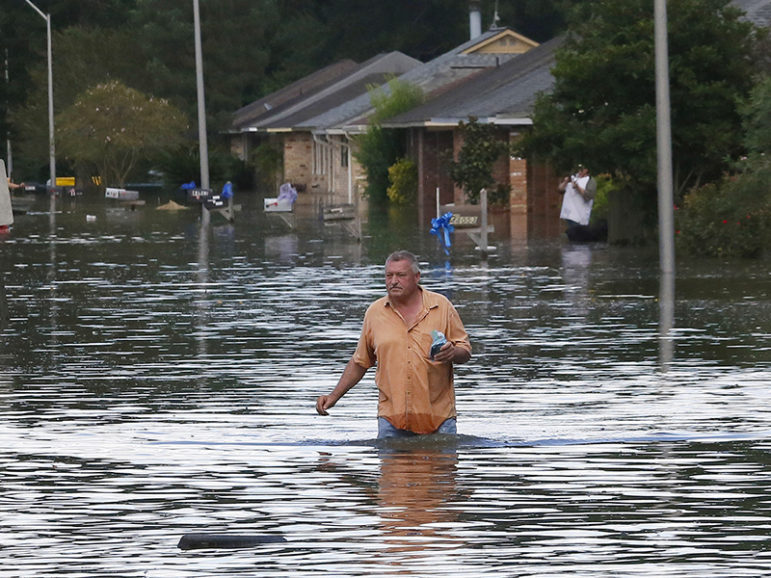Before a year ago, I never gave a second thought to the issue of Sea Level Rise (SLR).
And then, I moved to a neighborhood in Hollywood, Florida – fifty feet from the Intra-coastal Waterway.
I started hearing about Sea Level Rise. I read about the pending crisis on Miami Beach.
I read about how, if left unchecked, Sea Level Rise would condemn not only Miami Beach, and the Florida Keys, but entire neighborhoods in southeastern Florida.
Those houses would be under water – and not in the real estate meaning of the term.
Last week, during the epic “king tide” — a confluence of Sukkot and the full moon — I stood on a south Florida street as the waters came slowly rushing in, ultimately coming up to my mid-calf.
Our congregation, Temple Solel of Hollywood, Florida, has created two coalitions – the Higher Ground Initiative and Sea Level Rise Solutions. The Higher Ground Initiative has been recognized by the Reform movement’s Religious Action Center.
The Higher Ground Initiative has called for the Sabbath of November 4-5, 2016 – the Sabbath when Jews read the story of Noah – to be Sea Level Rise Sabbath.
We are asking congregations to teach about SLR, its implications, its challenges, some of its creative solutions.
Why?
Because you cannot tell the Jewish story without talking about water: crossing the Red Sea out of Egypt; crossing the Jordan River to get into the land of Israel; weeping “by the waters of Babylon” (Psalm 137). Jews have been merchants and traders, and you need bodies of water to make that happen.
That is how Jews established communities in this country — as merchants, traders, and ship builders. That is how we got to Savannah, Charleston, Newport.
And those communities — the oldest Jewish communities in North America– are at risk from rising waters.
Play Jewish geography. How many Jewish communities are within ten miles or less of a major coast line? All of Florida, Norfolk, the Jersey shore, the north and south shores of Long Island, Brooklyn, Manhattan, coastal Westchester County, Connecticut, Rhode Island, Massachusetts.
Throw in New Orleans, Houston, and the Pacific coast. If SLR affects lakes as well, that would include Chicago, Detroit, Cleveland, Buffalo…
This is where Jews live. Sea Level Rise affects the vast majority of American Jews.
By the end of this century, sea level rise could force 13.1 million Americans from their homes. This would become the largest galut – forced exile – in history.
For the Jews, this is an old story.
Nowadays, the Jewish ghetto in Rome is a cool tourist destination. It wasn’t always that way. In the 1500s, the Pope forced the Jews to live in cramped quarters on the left bank of the Tiber River — the lowest point of the city; below sea level; and prone to constant flooding.
Why did the Church force the Jews to live in an area that was prone to flooding?
Because the Church had power, and the Jews did not.
The story has not changed that much. Today, Sea Level Rise disproportionately affects poor, low-lying neighborhoods.
That is how I “got religion” on the SLR issue.
I came to realize that the basic religious texts of the Western traditions tell us to worry about Sea Level Rise.
First, the beginning of Genesis – Genesis 1:28. God commands humanity: “Be fertile and increase, fill the earth and master it…”
God endowed humans with a large responsibility – to be stewards of God’s creation. The ancient sages imagine that God had made many previous worlds, but those did not work out. So, God said to humanity: “This is the last world that I am going to make. Take care of it!”
Second, ten generations later, the story of Noah – Genesis 6. The ancient sages surmised that Noah tried to warn earth’s inhabitants about the deluge, and failed. Other sages disagree: Noah saved his own family, and ignored the suffering of others.
But there is a third piece. Ten generations after Noah, Abraham would appear on the scene of history – Genesis 12. God told Abraham and Sarah to leave their homeland, and to make a new beginning.
It was a disruptive moment in their lives, but that disruption started Western religion. During a famine in Canaan, Abraham and Sarah venture south to Egypt. The story of Abraham is one of constant adaptation and resilience.
Perhaps we will be unable to stem the tides. But, like Abraham and Sarah, we might see this crisis as opportunity.
It might mean raising coastal roads to avoid rising waters.
It might mean creating waterparks that will accommodate the possibility of invading waters.
It might mean re-thinking how and where we live.
But, one thing is for sure.
The Noah option of avoidance of the looming issue will not work. We dare not be lulled into a false sense of security, thinking that the forecasts call for a crisis in fifty years – “and we will not be alive then, anyway!”
We cannot find ourselves in Noah’s situation – staying silent and building an ark just for himself, his family, and a selection of God’s creatures.
Because, it is not just about water damage to homes and property. Rising waters means more moisture, which means more mold, which means more risk to health, which means rising health costs, which means over-burdened health care systems…..
This is big.
If the proverbial boat is Noah’s ark, we are all in this one together.






